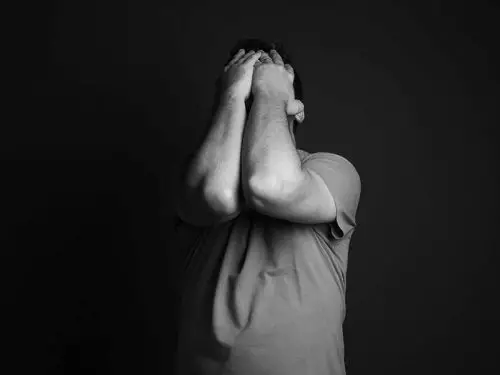How To Deal With The Grief Of The Death Of Your Husband?: The loss of a loved one to death, whether it may be a parent, a child, a spouse, or a sibling, is one of the greatest and the most heart-wrenching tragedies that life makes one go through. And coping with this sort of loss is perhaps the most difficult and burdensome of challenges.
When you lose someone close to you, for instance, a spouse, the grief, shock, and heartbreak cannot be matched. It can take a particularly intense toll on you even though it may be understood that loss is a part of life, but it can still be successful in overpowering you even after years.

Inspiring your journey, one story at a time. #LifeFalcon.
This kind of grief is not something that simply evaporates away. You wake up one day, and you are not heartbroken anymore, no.
It resurfaces again and again on and off through time, maybe on an anniversary, or a birthday, other special days that might have been significant to you when your husband was alive, or perhaps just a day when you feel lamentably alone.
Inarguably, it is purely devastating to lose a partner. The person you have most probably spent the most special moments of your life with; someone you might have wanted to have kids with, or you already have. Someone you have loved with all your heart, one day they are there, and the next, they are gone.
“For life and death are one, even as the river and the sea are one.”– Kalil Gibran
Initially, I can reassure you that the suffering will subside, it might cost you months or even years for you to get back to life, but it will de-escalate, and you will be able to gather the shattered pieces to build a new life for yourself.
However, until that time comes by, here are some tips that can assist you to cope.
Table of Content
Recognize your loss:
The manner in which the death of your husband hits you cannot be the same as everyone else. Your marriage was distinctive to the both of you.
No two marriages are the same, hence the loss of a spouse comes as a different blow to all surviving spouses.
This is why you should not let yourself think that you are not grieving “correctly. ”
For example, in the life of some couples, financial matters are in the hands of one, whereas in some, they are a mutual aspect.
If you were in the latter type, finances might not disturb you in any sense except for the fact that you might feel detached from work for a while and will not be able to head to your office. That is completely acceptable and normal.
However, being in a relationship where your husband was the only one aware of your financial situation and the manner in which your financial needs had to be looked after.
So it is a possibility that you find yourself in a pool of confusion and debt too if your spouse had ever taken any.
There are way too many scenarios that a wife might find herself in upon the death of her husband.
Perhaps it had been a long marriage, maybe a short one. Maybe you had children who have now grown up or maybe no children at all.
Maybe your relationship with your husband was a struggling one, going as far as being abusive. Then your grief might be entirely different.
Whatever the case, the loss of a spouse is difficult even if the magnitude of your grief is not the same.
Take it easy on yourself:
The loss of a loved one can throw you into a whirlwind of emotional distress and can cause you to experience emotions that you didn’t even know you could feel.
The sorrow of the love of your life leaving you.
The guilt of being the one left behind, the shock of your partner suddenly departing from you.
Maybe the relief that your husband is not under the same painful sufferance of his illness, the loneliness because you are just left alone at home, in bed, and life.
The anxiousness that this loneliness causes because you are clueless of how you are going to support yourself now (if you were purely depending on him) and how are you going to take care of yourself; These are all just a couple examples.
Grieving is not a one size fits all aspect. It is unique to everybody, and everyone deals with it in a different manner like I said previously.
For some people, crying is the only way to release the emotions bottled up inside. Whereas, some people cannot cry a lot.
At a time like this, you might have people criticizing you for not grieving in the “right” manner.
I know it doesn’t make any sense, but people like to poke into each other’s lives, and the most important tip for when it happens will be to just tune out of the criticism and focus on yourself.
Take your time and let yourself come to terms with it.
It will not be easy, but it is not entirely impossible as well.
Do not let people get to your brain.
You have already been through enough.
Take care of your health and make efforts to sort your social life out once you are capable enough.
It is natural to see your mental health come to a standstill when you lose a loved one.
It is particularly hard to keep your mental health in check when something like this happens, and we will not ask you to force yourself to do it.
However, during trying times like these, even if you cannot take care of yourself mentally, it is advisable that you try your best to stay physically healthy.
Surely there are ways that will help you to take care of your mental health as well, and we will get to those as the article proceeds; other people can help you nurture your mental health.
However, it is only you who can keep your physical health in check. And undoubtedly, it is extremely important to do so because grieving consumes a lot of energy and is a really intense process for your body and mind.
People going through such situations lose sleep and appetite sometimes, so be prepared for that.
And I know it is easier said than done but you need to take the hard to swallow pill if you want yourself out of your turmoil as easily and quickly as possible.
Try to eat as healthily as you can, give exercise a shot, and try to bag as much sleep as you can so your grief does not suck all the energy out of your body and brain.
It is important to note that yes, even though a time like this can give you the uncontrollable desire to drink or smoke in an attempt to swallow your pain, but try not to get into any of that because it will project adverse effects on your health not only now, but for the rest of your life as well.
I know it is not easy to do so, but as you start to heal, give yourself a chance to interact with friends and family and make plans with them just so you can be able to get your mind off of things.
Inviting someone over for a sleepover, or planning a simple lunch with your friends, or just hanging out with your family will surely help to divert you and make you understand that one cannot die with the dead.
If you have children, ask them to come over and spend a Sunday with them or catch a flight to see them.
They need you and you need them.
And spending time in the comfort of each other will help both of you out of your trauma better.
If you cannot find the energy and will to do much, then just getting up each day and fixing yourself a good healthy breakfast is enough.
Change into fresh clothes and pray as much as you can so you can easily get out of such a dark time.
In case you seem to be struggling with doing everyday activities like these, let your healthcare provider know so you can be cared for.
It is natural to feel awkward going to “couple” dinners with friends now and if you were used to doing it with your partner before his death, then it can be specifically difficult.
Under such circumstances, let your friends know that you are not comfortable enough to do so.
Being single might lead to a deterioration of “couple” activities, but at the same time it can help to give you the opportunity to make new friends who are a lot similar to how you are in your new life.
Get support
Coping with the loss of a life partner is extremely difficult and sometimes seems impossible.
In such a case, contacting a therapist can be of immense help.
It is normal to feel alone, shocked, devastated, and depressed in a time like this.
However, it is also extremely important to deal with the sorrow now to avoid any onset psychiatric disorders later.
On the other hand, joining a support group is also a great option and it can be really comforting to be able to heal amongst people suffering from the same sort of grief.
If you do not prefer to come into physical contact with anybody, then online therapy programs have a great reputation too.
There are various good, tried, and tested ones available online for you to choose from.
However, as we made it clear previously, every marriage is different and while joining support groups that focus on spouse loss, it is normal for you to not find a lot in common with the other members.
At this point, a lot of people think that there is something wrong with them, however, that is not the case.
You are grieving your loss in a manner that is specific to you, while others are doing what suits them.
So the point is, that if you are ever met with a situation like this, give the groups the room for error and try joining another group that might be able to help you heal.
Sometimes it is even said that it is better to grieve alone because it helps you to sort your emotions out quickly and easily.
If that’s what suits you, then choose that path. It does not matter what people say or what the norm is.
If joining a support group makes you feel like you can pull yourself back up, then do it.
If you think that isolation is the only way to do so and that seeking external support is useless because it does not detach you from your sorrow, then choose that option. It is up to you.



















